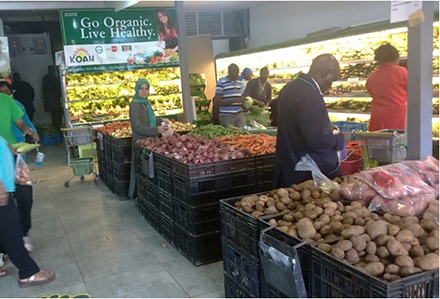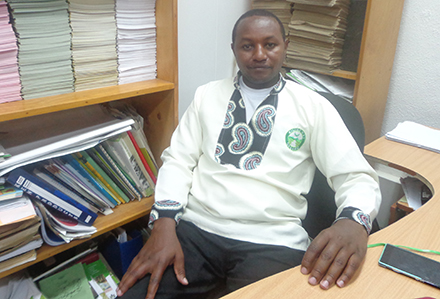Economic analysis of smallholder organic vegetable production system in Kiambu and Kajiado counties of Kenya
Samuel Ndung'u, Kenya
In Kenya, there are more than 200,000 farmers who have been trained on organic farming technologies and systems. Currently certified land under organic management in Kenya stands at 104,211 ha while the organic sub sector employs 12,647 farmers who are directly involved in production of different organic products. Although there are many documented reasons that make farmers to adopt organic farming system, economic benefits present one of the major motivations factors of converting to certified commercial organic production. With availability of information on benefits of converting to organic farming, farmers will adopt the technology due to the various benefits accrued.
In this study, I was expected to evaluate the determinants of adoption and profitability of smallholder organic vegetable production system in Kajiado and Kiambu counties of Kenya. I was also expected to evaluate the impact of organic production system on profitability of smallholder vegetable production systems in the two counties so as to appraise its contribution to improvement of rural livelihoods. Availability of this information once communicated was to help farmers make a decision on adoption f organic production system.
From this study, I found organic vegetable production system had a positive significant impact of increasing farm gross margin by 45.16% for smallholder producers in Kiambu and Kajiado Counties of Kenya. I also found organic vegetable prices to be higher than conventional vegetable prices for all the vegetables. Additionally I found organic production system to have higher production cost but higher gross margin as compared to conventional production system. Age, farming experience, irrigation, land ownership and County of residence were found to be associated with adoption of organic vegetable production system. Furthermore age, farming experience, number of trainings attended availability of irrigation, target market selected, production per acre, cost of production and price per unit had a bearing on the profitability of an organic smallholder vegetable farm.
From the study I recommend wide adoption of organic production system as a tool to improve farm incomes of smallholder vegetable farmers in Kiambu and Kajiado counties of Kenya. I also recommend that organizations involved in promotion of organic farming in the two counties should design strategies that take cognizance of the important role of social economic, farm and market factors in determining profitability and adoption of smallholder organic vegetable production systems.
The information I generated from this study is beneficial to extension officers, field officers and value chain actors who mobilize and train farmers. This is because it contributes to information available on benefits of adopting this system among smallholder farmers in the counties of Kajiado and Kiambu. It also benefits smallholder farmers by providing them with necessary information on profitability of organic vegetable production system to facilitate making informed decisions when converting to organic farming.

More about the project

Samuel Ndung'u, MSc.
Kenyatta University
Enrolment date: Feb 2010
Main Supervisor: L. Macharia
2nd Supervisor: R. Gathu
External Supervisors: Dr. J. Nzuma, Kostas Karantininis/Paul Kledal
Samuel Ndung’u graduated in July 2015.
He is senior marketing Advisor, Kenya Organic Agriculture Network (KOAN). He is responsible for development and implementation of organic market development strategies in Kenya; developing organic projects and programmes, supporting certification of organic projects; capacity development of value chain actors in the technical areas of organic production standards and certification; and assisting organic business in strategic business development.
Contact
Phone: +254 721 949 546
Email: samndungu@gmail.com and/ or ndungus@koan.co.ke
